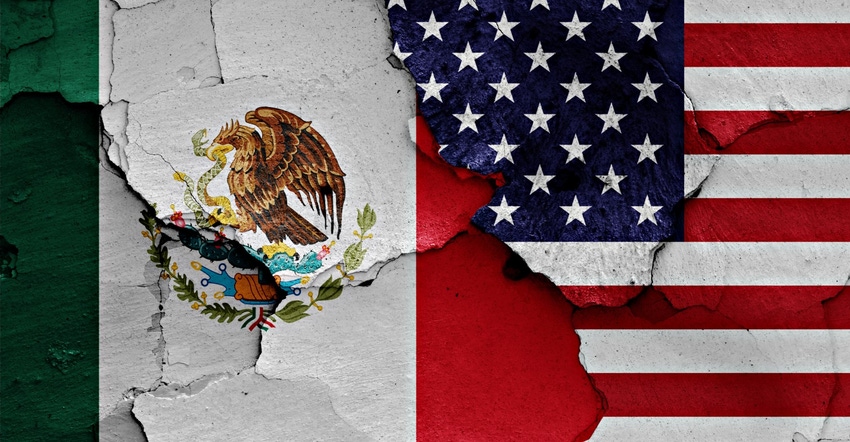
Of all the things that happened in 2020, a grenade was dropped on December 31 of that year when Mexico’s government published a decree aimed at phasing out GM corn and glyphosate use in the country. Two days later, Mexico’s president, Andres Manuel Lopez Obrador, made good on his campaign promise when he announced the country would end the import of genetically modified corn for human consumption by 2024. That decision is now impacting U.S. farmers’ ability to utilize and adopt technology key to addressing pests which will hurt not only U.S. farmers, but also bring higher prices to Mexico consumers.
Mexico’s proposed GM corn ban, expected to take effect in 2024, has the potential to increase the country’s food insecurity, add $4.4 billion to its corn import costs, and impose fundamental and costly changes on the U.S. and Canadian farming and grain handling sectors, according to a report published by World Perspectives, Inc., and commissioned by CropLife America.
Chris Edgington, Iowa corn farmer and president of the National Corn Growers Association, says farmers are already seeing a slowed approval of biotech traits in Mexico. Some companies are reluctant to push unapproved traits in Mexico if the country could potentially turn product away if it’s mistakenly mixed with approved traits.
Logistically, the U.S. is Mexico’s prime supplier of corn, however, they aren’t adopting biotechnology traits widely needed and accepted by U.S. farmers. Edgington explains if Mexico only allows the import of GM traits they’re currently accepting, within a few years those traits will no longer be on the market and Mexico may not have any approved corn events available to import. Some U.S. crop technology providers are moving towards technology including RNA and AI, which Mexico has not approved, and doing so because the companies recognize these traits are better for corn producers.
“We’re probably not going to change the trait train,” Edgington says of the need for growers to access more traits to deal with Mother Nature, pests and continue to adapt. “We need new technology,” he says.
“If the grenade goes off when he walks out the door at the end of 2023, the price to the consumers is going to be pretty large,” says Edgington.
New tactics needed
President Joe Biden, Secretary of Agriculture Tom Vilsack and U.S. Trade Representative Katherine Tai have all pointed out the issue in recent discussions with their counterparts. Ted McKinney, chief executive officer of the National Association of State Departments of Agriculture, says state governments have tried to communicate the negative effects of this policy within discussions with those at the state-level in Mexico.
“I would say we're entering a new phase and you should watch this,” McKinney says. “Up to this point. I think there have been a general feeling that okay, yellow corn is moving and starts and stops with white corn, but that trade by and large is okay. I'm now hearing the traits are not being introduced into corn, and the same with soy.”
McKinney continues, “Because there’s enough disruption starting to mount, and patience will wear thin in a few more months, maybe a year, we’ve got to change tactics.” McKinney doesn’t know how that exactly looks, but many different stakeholders are continuing to have discussions with government officials on how you put the pin back in the grenade.
In mid-August, members of MAIZALL - the International Alliance of Maize Growers, which includes members from Abramilho in Brazil, MAIZAR in Argentina and the National Corn Growers Association and the U.S. Grains Council in the United States – sent a delegation to Mexico where they met with government representatives and industry stakeholders to discuss the country’s 2020 Presidential Decree. The delegation also raised concerns about the likely impact of the lack of authorizations by Mexico of new GM corn events for import since May 2018.
Farmers from these countries, that produce 50% of the world’s corn and 81% of corn exports, compete in the global marketplace but work together to address common international market access issues.
Mexico’s annual import of 17 million metric tons of GM corn could be jeopardized by the combination of the presidential decree and the lack of authorizations of new GM events for import, MAIZALL says. Since it is very unlikely that such volumes of non-GM corn will be available in international markets in 2024, Mexico’s current policy will lead to food insecurity and affordability of many of its staple foods, such as corn tortillas.
The mission’s members emphasized the importance of a science-based, transparent and a proportionate regulatory approach to policy pertaining to agriculture and food production.
“In our countries, GM crops are evaluated by leading independent scientists as part of a rigorous process to ensure all approvals guarantee environmental and food safety,” says John Linder, a farmer from Ohio, who was part of the MAIZALL mission and is a MAIZALL director representing the United States. “Biotechnology helps farmers increase yield, reduce the use of plant protection products and conserve the quality and biodiversity of the soil and the environment – all key aspects in sustainable food production.”
Andrew Brandt, USGC director of trade policy, who also was part of the MAIZALL delegation, says there were positive meetings and good questions from the government officials involved. “MAIZALL directors had a successful trip to Mexico talking about the benefits of biotechnology,” Brandt says.
But at the end of the day, this still lies in the hands of Mexico’s President AMLO. A regulatory change will be required to allow additional traits to continue to be available to U.S. farmers as well as prevent the stop of flow of yellow corn to Mexico. If no action is taken, the end result will not be pretty.
About the Author(s)
You May Also Like






